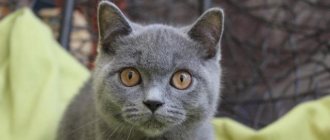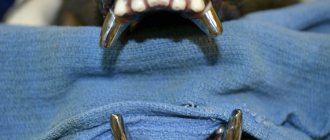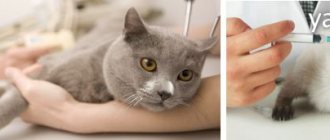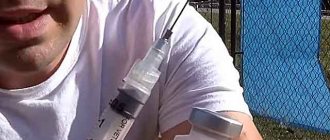Wanting to have a furry pet, many cat lovers prefer the British cat breed. These active kids are distinguished not only by their unusual color, but also by their “apartment” lifestyle. Such pets are rarely allowed outside and efforts are made to minimize their contact with other animals. That is why there is an opinion that vaccinations are absolutely unnecessary for a British kitten. Many owners of unusual pets are absolutely sure that if their pet constantly sits in the apartment, then it cannot catch any infection. However, as veterinary practice has shown, such an opinion is a misconception. Let's consider this topic in more detail.
Early development
With mother's milk, babies receive all the necessary substances that protect small pets from possible infectious diseases.
Therefore, the first vaccination of a British kitten during this period is not recommended, since the process of creating immunity in it can be disrupted. And thanks to this factor, many owners expect their pet to reach a certain age.
Features of the first vaccinations
If a kitten is fed by a cat, protective antibodies enter the body with her milk, which form its immune system. During this period, you should not get vaccinated so as not to disrupt the natural process of developing immunity.
The first vaccinations for British kittens are recommended at 2.5 months.
If the optimal age for vaccination has been missed, the vaccine can be given at 8 months. As the first vaccine, a complex drug against calcivirosis, panleukopenia and rhinotracheitis is administered. After some time (from 2 to 3 weeks), revaccination is required using the same complex drug. In the future, revaccination must be carried out every year.
The first vaccination, given correctly and in compliance with the revaccination schedule, will help to form a strong immune system in the animal. This will prevent infection with these diseases even in the presence of provoking factors. Recommended first complex preparations: Quadricat, Multifel-4, Felovax.
Features of vaccination among the British
The first vaccination should be done at 10-12 weeks, just when the pet has grown and become stronger. This vaccine can protect your cat from:
- calcivirosis;
- rhinotracheitis;
- panleukopenia.
This procedure must be repeated after 2-3 weeks and also add a rabies vaccination.
Barriers to awareness. When you're in the vaccine debate, you can't send your message. The real problem is that the science is quite complex and bizarre, the logic upstream of vaccination is somewhat flawed. It just doesn't make sense, so it's much more convenient to delegate the decision-making process to an "employee."
Unfortunately, this means that many people are not faced with the obligation to engage with vaccine-related issues, relying instead on someone else's opinion and at the same time having "incredible anxiety." If nothing else, 12 years spent at a leading Canine Health Conservator has shown me that the next necessary step in human development is this: taking responsibility for our lives and for those who come to our aid. The system is so complex and dominated by economics that we now have no other choice.
Regarding the British, their vaccination period is slightly different from other cats. The first vaccinations for British kittens are given at 8-9 weeks, the list of which is the same as for other cats. Re-vaccination is not carried out, as is rabies medicine, which is given much later.
The next stage is carried out already at 6-7 months, when the teeth change. Then the veterinarian carries out a revaccination, and if it is a British person, then he needs to be additionally vaccinated against rabies.
You cannot afford to expose your animals or your children to medical interventions that you do not understand about nature. The belief system on which the conventional medical model is based is so flawed, corrupt and dangerous that you simply cannot afford to trust it blindly.
In fact, they know more than most of us and dedicate their lives to healing the sick. There is certainly much good in the conventional medical model. Recent research shows that every year in the UK, many more people die from drugs prescribed by doctors than from road traffic accidents.
In an earlier period, vaccination is impossible, since teeth change at 4-6 months, which is why the animal’s body is weakened. If you do get vaccinated, complications may arise after it related to your pet’s health.
When should Britons get vaccinated, schedule?
The vaccination scheme for British cats, like other cats, is similar. The components of the vaccines depend on the future kitten: whether it will participate in procreation, live only in an apartment, house, or go outside.
What to do before vaccination:
- Deworming, treatment for skin parasites for 12 - 14 days;
- The kitten must be clinically healthy and examined by a veterinarian.
At what age is vaccination carried out:
- The first comprehensive vaccination for kittens is given at 8 - 9 weeks;
- The second complex vaccination for a British kitten is revaccination with the same vaccine, given after 2 - 4 weeks, depending on the vaccination;
- The rabies vaccination for a Briton is carried out no earlier than 3 months, without revaccination;
- The third complex vaccination is given to the cat a year after the second complex vaccination, then once a year;
- The second rabies vaccination is a year after the first rabies vaccination, then once a year.
If the vaccination schedule is violated, you should consult a veterinarian.
Adverse reactions after vaccination are possible, but this is rare. Vaccination is still more beneficial than harmful. Veterinarians can help with such reactions.
Risks after vaccination:
- Fever;
- Refusal to eat, lethargy;
- Encephalitis and polyneuritis;
- Changes in behavior, seizures;
- Arthritis, pain at the injection site;
- Change in fur color at the injection site, hair loss;
- Allergic, immune reactions: neoplasms at the injection site, reactions due to improper administration, inability to develop immunity after administration of the vaccine.
Viral diseases against which cats are vaccinated.
The main viruses against which you should be vaccinated:
- Panleukopenia, rhinotracheitis, calicivirus - included in one vaccine;
- Rabies virus.
Additional vaccinations:
- Leukemia virus, FelV - if the pet has access to the street;
- Leukemia and chlamydia virus - if the pet will participate in breeding.
Description of diseases:
- Panleukopenia is distemper, a viral disease of cats that affects the gastrointestinal tract, heart, respiratory organs, causing dehydration and general intoxication of the body;
- Viral rhinotracheitis is a herpes virus, an acute disease that affects the eyes and respiratory organs. All breeds of all ages are susceptible to the disease. Morbidity – 50%, mortality 5-20%;
- Calicivirus is a viral disease that affects the upper respiratory tract, characterized by ulcers in the mouth, tongue, nose, in severe cases pneumonia, rarely arthritis;
- Rabies is a fatal infectious disease that affects the brain and spinal cord of all mammals;
- Chlamydia is an infection manifested by eye diseases (conjunctivitis), inflammatory processes of the upper respiratory tract (rhinitis, pharyngitis, bronchitis), rarely affecting the reproductive system;
- Lichen - ringworm, microsporia, trichophytosis, the disease is characterized by the formation of hairless areas, peeling, redness, itching of the skin;
- Viral leukemia – leukemia, FeLV, feline leukemia, feline tumor disease;
- Viral immunodeficiency - FIV, FIV, feline AIDS, latent infection, affects the immune system, and in the final stages the nervous system;
- Viral peritonitis – IPK, VIPK, FIP, systemic viral disease. Two forms of the disease: wet - inflammatory fluid accumulates in the abdominal cavity, dry - the virus attacks various organs, kidneys and spleen. There is no treatment, the outcome is almost always fatal;
- Bordetellosis is an infectious disease manifested by inflammation of the trachea, bronchi and lungs. Respiratory problems: cough, shortness of breath, fever. Often occurs with other infections.
Vaccines | vaccinations for cats.
Which vaccine should I choose? Veterinary clinics offer different types of vaccines, with their own advantages and disadvantages. From Hanna Kennel vaccinates its pets with Purevax and Rabisin vaccines produced in France; these are the best vaccines now.
How much does a vaccination cost? Imported vaccines are many times more expensive than domestically produced ones, due to the quality and degree of purification. The current price of vaccination in veterinary clinics includes: examination of the kitten, cost of the vaccine and injections. Check with local doctors.
Approximate cost of vaccines in 2021:
- Multifel-4 – 6 $;
- Rabisin – $3.5;
- Nobivac Tricat Trio – $9.5;
- Nobivac Rabies – $4;
- Polivac TM – 1.5
- Purevax RCP – $14;
- Purevax RCPCh – $17;
- Felocell CVR – $8.
Table - Vaccines, vaccinations for cats
Rules for deworming:
- the drug against parasites is purchased depending on the weight of the animal;
- if there are several animals at home, deworming is carried out all together;
- preventive deworming – once every 4 months;
- driving away parasites 12 - 14 days before vaccination;
- driving away worms and fleas 12 - 14 days before mating;
- during therapeutic deworming, you need to give the anthelmintic twice, it may require more, with a period of 12-14 days. In one dose, only adult forms of worms are destroyed; in order to destroy the eggs from which helminths are hatched, the dose must be repeated within 10–12 days. If after the second dose of the drug there are signs of infestation, consult a doctor.
Tablets, drops for worms.
Viruses are not the only danger for cats. In addition, animals are susceptible to infection with external and internal parasites, regardless of whether they live at home or walk outside. The table below shows drugs to combat parasites and the age at which these drugs can be used.
Table - Tablets and drops for deworming for cats and kittens
Cats that live at home and have access to the outdoors should undergo timely treatment for external and internal parasites. They must also receive the necessary screenings and vaccinations. This must be done in veterinary clinics, which guarantees a high-quality examination, high-quality vaccines, timely assistance in case of unwanted reactions, an official seal and signature in the veterinary passport. The opinion that a pet does not need any of the above is erroneous and threatens with dire consequences.
Deworming and its features
To do this, it is necessary to carry out a procedure for cleansing the animal’s body of worms 2-3 weeks before the first vaccination. This is done as follows: anti-helminth medicine in the form of drops or tablets is added to the pet’s food. This is the initial stage of treatment, after which most adult worms will pass in the feces.
A team at Purdue University School of Veterinary Medicine conducted several studies to determine whether vaccines can cause changes in dogs' immune systems, causing a potentially fatal immunodemic disease; of course, carried out the research in question, since it was already feared. The study was funded by the Heywood Foundation, which sought to find evidence that such changes in the human immune system could also be caused by vaccines. Conclusions have been found.
Therefore, vaccines appear to be able to eliminate natural cellular intelligence. Cardiolipin antibodies are often present in patients with severe systemic lupus erythematosus, as well as in subjects with other autoimmune diseases. The presence of high levels of antibodies to cardiolipin is significantly associated with clots in the heart or blood vessels, poor blood clotting, general and skin bleeding, fetal loss, and neurological disorders.
After 10 or 12 days, you can repeat the procedure to kill young, newly hatched worms. And only 5 days after the second stage, you can safely vaccinate.
If you are not sure whether your British kitten has worms, there is an easy way to find out. To do this, you need to take a stool test, through which you can determine this. And only then carry out the procedure of cleansing the animal’s body of helminths. After all, unnecessary use of such medications can negatively affect your kitten’s health.
About a quarter of all proteins in the body are collagen. Collagen provides our body structure, protects and supports soft tissues and binds them to the skeleton. Perhaps the bell is ringing? The scientific community has called for the suspension of a vaccination program containing tissue culture contaminants that induce a progressive direct immune response to heart valve connective tissue.
Meanwhile, be kind to the queue to put your dog, cat, horse and baby into Russian roulette just because a scientist tells you you should. In other words, as recognized and accepted as part of the process caused by the vaccine, the body responds with inflammation, which may appear to be temporary or long-lasting.
Preliminary procedures
Before carrying out the manipulation, you should prepare so that no problems or complications arise after vaccination. The first thing you need to do is buy a dewormer. It is best to consult a doctor about the drug. Next you will need to treat the four-legged dog for fleas and ticks. After three days, the cat should be thoroughly bathed. The shampoo must be intended for animals so that the cat does not develop poisoning or allergies. It should be remembered that cosmetics for people are not always suitable for pets. After this, you can go to the veterinarian, who will conduct an examination and give the go-ahead for the procedure.
They may refuse if:
- The animal is sick or has recently been ill.
- For some reason the cat has a weakened immune system.
- The cat is pregnant.
- The cat recently gave birth.
- Kittens are up to two months old.
In this case, the doctor will tell you when you can come again to be sure to get vaccinated.
Preparing for vaccination
Every owner remembers when to vaccinate their British kittens. But some time before this, preparations for vaccination need to be made. And the first thing to do is to remove helminths from your pet.
An important point is getting rid of parasites - fleas and ticks.
© shutterstock
In the case of small British pets, they need to be bathed with a special shampoo, while adults can use the appropriate products.
And the last stage is an examination by a veterinarian on the day of vaccination. He will evaluate the condition and appearance of the cat, since animals must be completely healthy during this procedure. British kittens are also vaccinated.
Mechanism of action of the vaccine
When pathogenic microorganisms enter a cat's body, the immune system produces protective factors that destroy foreign agents and neutralize the effects of their toxins. Such immunity can be formed after the kitten becomes ill with an infectious pathology and recovers. However, the body's first encounter with pathogenic microbes is very dangerous, often causing severe illness and even death.
To avoid this, it is necessary to vaccinate British kittens, give the first vaccination at 2 months and then follow the revaccination dates in the future.
Vaccines contain killed or weakened strains of microbes. They cannot provoke the clinical manifestation of the disease, but at the same time they cause the formation of immunity. This process occurs in several stages:
- The body's encounter with infection after the first vaccination of a British kitten.
- Identification of a foreign agent by the kitten's immune system.
- Synthesis of antibodies that are directed against a specific pathogen.
- Destruction of the pathogenic agent.
- Removing microbes and their metabolic products from the pet’s body (subject to the introduction of live microorganisms).
- Saving information about this pathogen in the “database” of the immune system.
If infection subsequently occurs, the kitten’s body will be ready to resist, since it already has developed immune factors.
This is interesting: Diseases of British cats
Vaccination schedule for British kittens
What matters is not only the choice of mandatory and additional vaccinations, but also the correct period of their vaccination in compliance with the schedule. To maintain a strong immune system and the concentration of antibodies at the required level, it is not recommended to violate this schedule. Vaccination plan by age:
- From 6 to 8 weeks - deworming is mandatory.
- From 8 to 10 weeks - introduction of complex vaccination against diseases such as panleukopenia, calcivirosis and rhinotracheitis.
- From 11 to 13-14 weeks - revaccination with a complex drug (3-4 weeks after its first administration).
- 1 year - another revaccination with a complex vaccination is recommended.
In the future, other vaccinations (both mandatory and optional) may be given once a year.
What happens if you don't get vaccinated?
Vaccination is an important preventative procedure that minimizes the risk of contracting dangerous viruses and infections. Refusal to vaccinate an animal is like playing Russian roulette, which is especially true for cats that regularly visit the street.
If your pet never goes for a walk and does not come into contact with other animals, it is recommended to vaccinate against at least the three most dangerous infections transmitted by small rodents, birds and dust that settles on clothes, shoes and household items in the house.
A kitten can become infected with rabies only when the saliva of a sick animal gets into the blood of a healthy one. As a rule, this can only happen as a result of a bite from an infected cat or dog. If your cat never goes outside, the risk of contracting this deadly disease is fortunately negligible.
But we should not forget that cats are very dexterous, curious and brave animals. An accidentally unlocked door or an open window - and here it is, the long-awaited access to freedom. By running out into the street or even into the entrance, a pet can pick up an insidious infection that quickly develops into a deadly disease.
Whether your British cat needs vaccinations is up to you to decide! But remember, if you refuse to vaccinate your animal, you expose it to serious risks!
Tray for Maine Coon - choosing a closed toilet-house and filler
Maine Coon - care and maintenance at home
Cat’s breath smells – why does it stink and how to deal with it?
How to deliver a cat if she gives birth for the first time?
How to understand that a cat is giving birth and how many kittens she will bring?
Vaccinations for Scottish kittens - mandatory vaccination for your pet
You can buy a British kitten from us. Minsk. +(29, 44) 7-222-444
Many people today, when they get a cat or kitten at home, think about vaccinations. In this article we will look at all the information in detail.
- Do kittens and cats need vaccinations? Advantages and disadvantages
- What vaccinations should indoor and outdoor cats have?
- Vaccination prices, vaccine cost
- When do kittens get their first vaccination? At what age?
- All about the rabies vaccination
- Preparing for vaccination
- Vaccination schedule for kittens and adult cats: what vaccinations are given and when?
- Where to get vaccinated
What to name a British breed cat
There are a huge number of names for a pet. Sometimes it is very difficult to choose a nickname for a kitten, so people are interested in it on the Internet. You can name a cat based on coat color, behavior, personal preferences, or suggested lists in various articles. The latter is also suggested in the following table.
| Elva Mexico Angie Wally Fox Umka Violetta Kana Mouse Victoria Augustina Lilu Dulya Shila Chapa | Tracy Ava Blizzard Shada Furia Nirvana Vixie Griza Zulya Lisyona Zosya Barsya Oleri Smetanka Faina | Bundy Tiger Rubin Kiryan Kent Bruce Winston Mao Khazar Fafik Mason Chessie Anton Lux Fox | Plakun Cam Sibelius Oscar Jean Danube Cupid Fonya Adams Bryce Cornflower Topaz Vulcan Fedor Bruce |
Possible complications and contraindications
Vaccination is a safe preventative measure that helps preserve the health and even life of your pet. In most cases, animals easily tolerate the drugs, but there are exceptions. A negative reaction in the form of a number of complications can be caused by:
- individual characteristics of the body;
- administration of the drug if the animal has contraindications;
- poor quality vaccine;
- failure by the owner to comply with the rules and recommendations for caring for the pet during the period after vaccination.
Within a few days after administration of the drug, the kitten's behavior may change slightly.
This manifests itself in the form of decreased activity, mild lethargy, depression, refusal to eat and drowsiness.
This reaction is considered the limit of normal and does not indicate pathology. These signs will go away on their own within 2-4 days.
The fact that the animal’s body did not tolerate vaccination well is indicated by the following symptomatic picture:
- refusal to eat for 2 or more days;
- gagging, prolonged diarrhea;
- impaired coordination of movements;
- change in the appearance and condition of the coat (active hair loss);
- itching of the skin;
- elevated body temperature that lasts more than 2 days and does not decrease;
- swelling in the throat;
- convulsions;
- fainting.
Some cats may develop anaphylactic shock. When it appears, immediately take the animal to a veterinary clinic.
Prevention of complications after vaccination is proper preparation for the procedure, which includes examining the pet and identifying possible contraindications.
It is strictly forbidden to vaccinate “British” people who have been diagnosed with viral and infectious diseases in the active stage.
Vaccination is also not given to kittens with a weakened immune system, or in the presence of defects and anomalies that are discovered after birth.
ADVANTAGES AND DISADVANTAGES
| ADVANTAGES of vaccinations | DISADVANTAGES of vaccinations |
| 1. Protection from infectious diseases 2. If a cat scratches/bites someone, you will be relieved of all responsibility (since it is guaranteed not to be sick) 3. A cat or kitten can be freely exported outside the country 4. The opportunity to participate in exhibitions 5. Breeding of purebred cats is allowed only in a vaccinated state 6. In vaccinated mother cats, the offspring are also protected for the first time through the immune system, which strengthens with the resulting milk 7. Vaccinated cats can be easily taken with you to the country, on the train, on vacation, and also let them go outside 8. Inner peace from the fact that your beloved pet is protected from infections | 1. After vaccination (less than 1%), side effects are possible. The most common: drowsiness, lethargy, loss of appetite. As a rule, this goes away within a day. Even less likely are cases of allergy to the vaccine, in which there is swelling of the larynx, muzzle, and paws. May also be accompanied by itching, vomiting, and diarrhea. But such cases are rare. If this suddenly happens, you need to contact a veterinarian immediately. 2. The material side of the issue. Vaccinations cost money. Especially high quality ones. |
Kitten's reaction to the vaccine
Immediately after your British cat's vaccination, the following changes may occur:
- there is lethargy, apathy and slowness in movements;
- excessive sleepiness of the animal;
- lack of appetite;
- allergic reactions are possible.
If kittens are vaccinated on time, the reaction indicated in the last paragraph is very rare. Since in most cases the cat tolerates vaccination easily. And after 6-7 hours or, in extreme cases, a day later, it returns to its previous state . If you still notice some symptoms (swelling of the throat), you should immediately contact a veterinarian.
The most common infectious diseases of cats
Herpesvirus and calicivirus infections. Symptoms: damage to the upper respiratory tract, conjunctivitis, ulcers in the oral cavity; in addition, with calicivirus infection, joint damage may be observed, and with herpesvirus infection, miscarriages and early death of the offspring are observed. Panleukopenia (plague) of cats. Symptoms: fever, vomiting, diarrhea, obvious thirst, but the animal refuses to drink. Toxoplasmosis. Clinical symptoms of the disease practically do not appear; uncharacteristic symptoms of this disease are vomiting, diarrhea and fever. The causative agents of this disease are contained in raw meat (therefore, the meat must first be frozen before feeding the cat), spread in the environment, and in particular, through the excrement of sick cats. Toxoplasmosis poses a threat not only to cats, but also to humans, especially to pregnant women, so doctors recommend that women during pregnancy avoid contact with the cat's litter box.
The only way to prevent infectious diseases and keep your British cat healthy is timely preventive vaccination.
Mandatory vaccinations
Some vaccinations for British kittens should be mandatory. If this is not done, then the animal, having become infected, can infect those pets who live nearby, and also die.
Pets must be vaccinated against:
- rhinotracheitis;
- pancleicopenia;
- calcivirosis.
Each of these diseases is very serious, can be severe and lead, if not to death, then to serious health problems that will remain forever. Vaccination is done based on the vaccination schedule. Adult pets have their own, and kids have theirs. Once kittens reach two months, they are allowed to be vaccinated, but you should refrain from the procedure when small pets are teething. During this period, it will be difficult for the body to resist infections that have entered the body.
Vaccination dates
After the first necessary vaccinations have been given to the Briton, you need to stay at home with your pet for some time, since during this period the animal’s body is weakened. And after that, you need to:
- revaccinate after a month;
- this is followed by 1 month of quarantine, during which all contact with other animals and people must be excluded;
- After 1 year, it is necessary to vaccinate again against the same diseases and additionally against rabies.
These stages constitute the vaccination schedule for British kittens. Therefore, you need to remember them in order to carefully monitor your pet and its vaccination.
© shutterstock
Complications from vaccinations
Vaccination of cats is a relatively safe preventive procedure that causes side effects and complications in the rarest cases. Typically, adverse effects occur for a number of reasons:
- the vaccination was given to an unhealthy animal;
- the vaccine administered turned out to be of poor quality;
- improper care of the kitten after vaccination;
- individual intolerance by the animal’s body to one or another component included in the vaccine.
Rabies vaccination
Another important vaccination that cannot be forgotten is the rabies vaccination. This is a serious disease that can be contracted completely accidentally through contact with a carrier. Considering that the disease currently has no cure, all animals must be vaccinated.
When the British kitten has reached three months of age, you can safely contact the veterinarian to get vaccinated. If for some reason you do not have time to go to the doctor at this time, vaccination is postponed for 5-6 months . Experienced breeders draw the attention of owners to the fact that half of the animals do not tolerate the injection very well. Pets develop a fever on the first day and refuse to eat. This is a normal reaction, so there is no need to panic. At the same time, it is recommended to ask your doctor in advance what to do if this happens. The Nobivak vaccine is often used for vaccination, but another one can also be used. The American Fel-O-Wax has proven itself well.
Vaccination and the unsatisfactory condition of the animal on the first day is not a reason to sound the alarm, but only if the following symptoms do not make themselves known:
- incessant vomiting;
- severe diarrhea;
- numbness of the limbs (cold paws);
- very high temperature;
- weakness and depression of the baby.
In this case, you should definitely take your pet to a medical facility so that the veterinarian can assess the kitten’s condition and tell what is causing it. However, you shouldn’t beat yourself up in advance, because negative aspects are the exception rather than the norm.
What infections do cats suffer from?
The British are susceptible to the same infectious diseases as their other relatives.
Among them are:
- Hyperviral and calicivirus infections. In this case, the animal suffers from respiratory tract damage, conjunctivitis and joint problems.
- Panleukopenia. This disease is most often called feline distemper. The animal loses its appetite and begins to suffer from vomiting, diarrhea and severe thirst.
- Toxoplasmosis. Externally, this disease practically does not manifest itself in any way. Infection occurs if your pet eats raw meat. It is worth noting that this disease is dangerous not only for the four-legged pet, but also for all household members.
To prevent the occurrence of these dangerous diseases, as well as rabies, furry pets must be given appropriate injections. It remains to figure out when to vaccinate British kittens. It is also worth considering the possibility of vaccination at home.
Which vaccine to choose
When choosing a vaccine, you need to consider the following factors:
- epidemiological situation;
- conditions of detention;
- physiological state of the kitten.
The most popular vaccines are Felovax and Multifel-4, they are used from 2 months of age. But if there is a real threat of kittens becoming infected with these viral diseases, then it is better to use Eurifel RCPFel.V or Leucorifelin, since they can be administered from 7 weeks.
For the first vaccination of a cat, veterinarians do not recommend using a vaccine that contains the rabies pathogen, so as not to create an excessive burden on the baby’s immune system. It is better to administer the monovalent drug during revaccination or separately after 12 weeks of age.
What to do if the vaccination schedule is broken
If the kitten has not been revaccinated after the first vaccination, it must be done as soon as possible. To ensure effectiveness, it is worth taking a blood test after 3-4 weeks to determine the strength of the immune system.
Care and monitoring of animals during the post-vaccination period
After the first vaccination, a vaccinated British kitten requires special attention from the owner. Slight lethargy and loss of appetite within 1-2 days after the procedure are considered normal. However, there are symptoms that require immediate attention to a veterinarian.
These include:
- refusal to eat for more than 2 days;
- signs of intestinal disorders;
- loss of coordination, unsteadiness of gait, convulsions and other nervous phenomena;
- skin manifestations of allergic reactions (redness, rash, itching, hair loss);
- swelling of the larynx, which is accompanied by suffocation.
Important! If the drug is intolerant, the kitten may develop anaphylactic shock. In most cases, it appears within 20-30 minutes after vaccination. Therefore, it is worth staying at the clinic so that the baby can be provided with professional, timely assistance.
The final formation of immunity in kittens occurs 3-4 weeks after revaccination. Therefore, it is necessary to exclude contact with other pets and environmental objects. You should also ensure that your baby is not exposed to stress, drafts or sudden temperature changes during this period. You cannot radically change your diet and introduce several new products into it at once.











